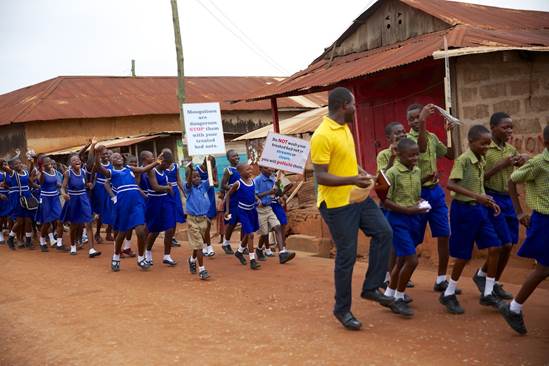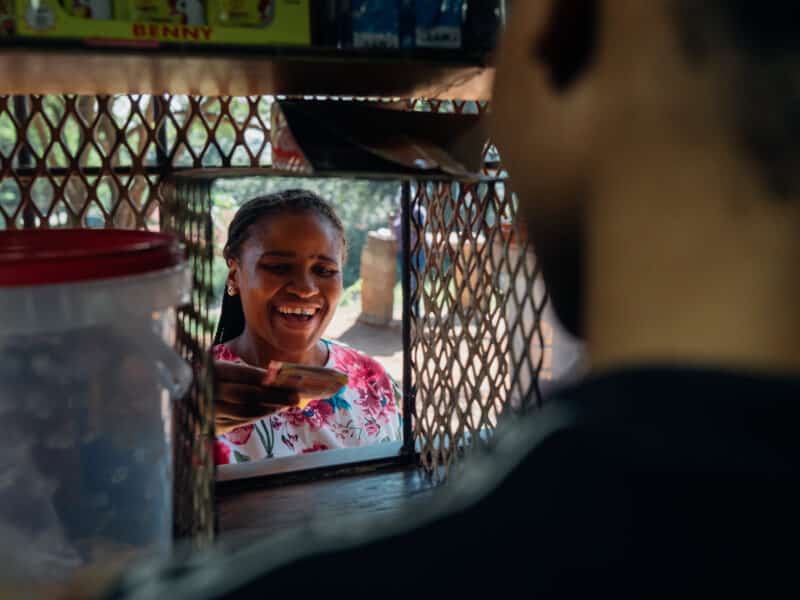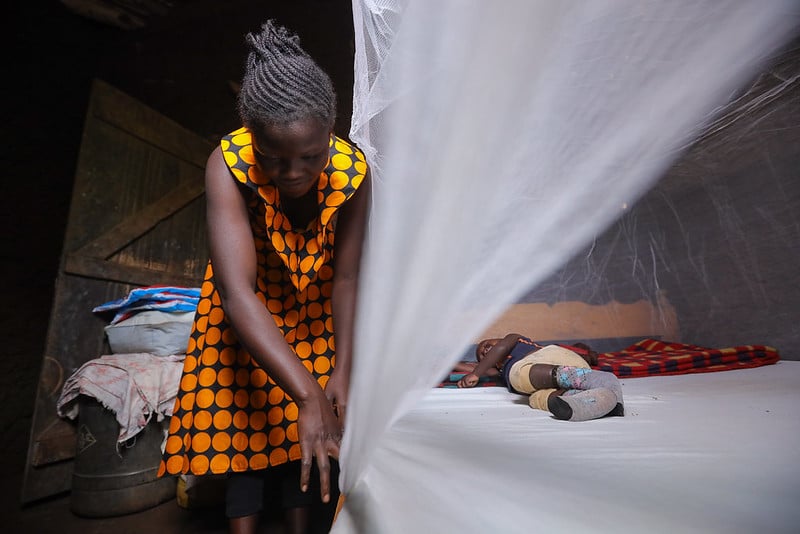There was overwhelming support on May 23, 2016, for the launch of the country-wide campaign to distribute insecticide-treated nets (ITNs) to 1.2 million children in over 14,000 public and private primary schools in the Volta, Eastern, Central, Western, Ashanti, and Brong Ahafo regions of the country. The event took place at Odumase in the Lower Manya Municipality of the Eastern Region and was led by the National Malaria Control Program (NMCP) of the Ghana Health Service and the Schools Health Program of the Ghana Education Service, in partnership with the VectorWorks project funded by the U.S. President’s Malaria Initiative (PMI). The event was well-attended with over 1,000 people present, including education and health officials, chiefs, queen mothers, parents, teachers, and schoolchildren.
The NMCP manager, Dr. Constance Bart-Plange, spoke. She reminded attendees that distributing ITNs in primary schools is an important channel of Ghana’s Continuous Distribution Strategy, through which the NMCP ensures that households will receive additional ITNs to improve families’ capacity to effectively prevent malaria.
Dr. Bart-Plange reiterated the important messages that were written on placards and carried through the town by schoolchildren in a route march to the event grounds, including:
- A malaria-free community is a healthy community. Sleep under your treated net every night and be free from malaria.
- Mosquitoes are dangerous. Stop them with your treated bed net!
- Mosquito nets are not for fishing and not for fencing gardens. STOP it!
- Be safe from malaria. Your ITN is your protector.
- Do not wash your treated net in streams and rivers. You will pollute the waters.
“These and many more are the positive actions you must continue to take in your communities to ensure the ITNs received, either from the mass campaigns, from the health facilities, or through the primary school distribution, are purposefully and efficiently used to prevent malaria,” Dr. Bart-Plange stressed.
The Ghana Education Service was represented by Mrs. Cynthia Bosomtwe, Director of Basic Education, who called on all teachers in the primary schools to develop a keen interest in the health of the children they teach, especially on issues related to malaria prevention. Mrs. Bosomtwe emphasized that teachers, as much as they can, should integrate the recommended malaria prevention activities described in the Teachers Communication Guide with other formal and extracurricular activities that go on in the schools: “In the long run, every teacher should become an advocate for malaria prevention among their fellow teachers and among their pupils’ parents through the Parent Teacher Association meetings.”
In launching the campaign, the Honourable Deputy Minister of Health, Dr. Victor Bampoe, called on the education and health authorities, teachers, community health workers, and community leaders to honestly and efficiently play their part during the free school-based ITN distribution by ensuring that ITN stocks are properly secured and that only the children for whom these ITNs are intended receive them. “These bed nets are strictly NOT for sale,” he emphasized.
Dr. Bampoe commended the U.S. government and PMI for its continued support of the annual primary schools ITN distribution campaign and for its general collaboration with the government and people of Ghana in promoting health. He called on all Ghanaians to ensure that no one abused this opportunity. He cautioned that, if after all this support, Ghanaians fail to use malaria prevention tools, particularly ITNs, properly and effectively, “we would be doing ourselves and our support partners great disservice.” He reminded all Ghanaians that “money and other resources to be spent on treating malaria, when saved, can be used to support many vital developmental activities in the communities.”
Within a period of 10 days, all 14,000 public and private primary schools will be reached and over 1.2 million schoolchildren will each receive an ITN. Accompanying behavior change communication activities will continue in all schools throughout the year, to enable children and their families to cultivate the appropriate behavior for use and care of their ITNs.
Reposted with permission from VectorWorks. VectorWorks is a five-year (2014-19) global project to increase access to and use of insecticide-treated mosquito nets (ITNs) and other proven vector control interventions for malaria prevention. The project is funded by the President’s Malaria Initiative (PMI) under a USAID cooperative agreement.






